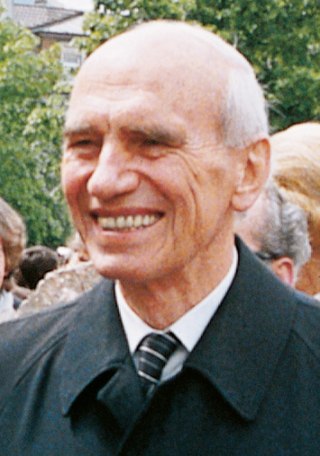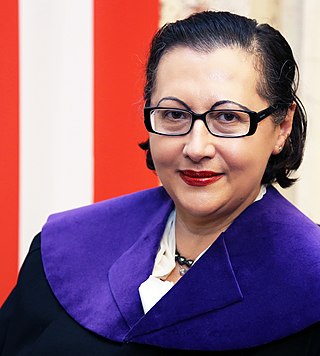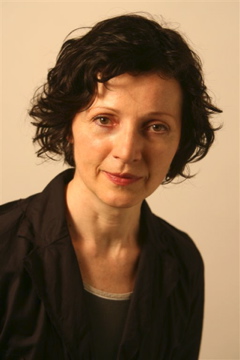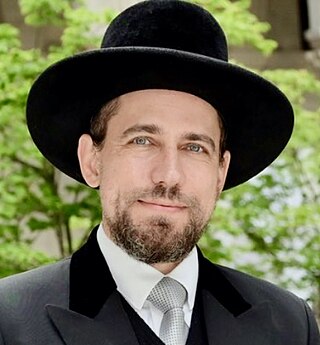
The Austrian Empire, officially known as the Empire of Austria, was a multinational European great power from 1804 to 1867, created by proclamation out of the realms of the Habsburgs. During its existence, it was the third most populous monarchy in Europe after the Russian Empire and the United Kingdom, while geographically, it was the third-largest empire in Europe after the Russian Empire and the First French Empire.

Erhard Busek was an Austrian politician from the Christian-conservative People's Party (ÖVP). Throughout his political career, he was widely regarded as one of the leaders of the party's liberal wing. He was coordinator of the South-Eastern Cooperative Initiative (SECI) and chairman of the Institute for the Danube Region and Central Europe.

Rudolf Kirchschläger, GColIH was an Austrian diplomat, politician and judge. From 1974 to 1986, he served as President of Austria.

A district is a second-level division of the executive arm of the Austrian government. District offices are the primary point of contact between residents and the state for most acts of government that exceed municipal purview: marriage licenses, driver licenses, passports, assembly permits, hunting permits, or dealings with public health officers for example all involve interaction with the district administrative authority.

Hilde Benjamin was an East German judge and Minister of Justice of the German Democratic Republic. She is most notorious for presiding over the East German show trials of the 1950s, which drew comparisons to the Nazi Party's Volksgericht show trials under Judge Roland Freisler. Hilde Benjamin is particularly known for being responsible for the politically motivated prosecution of Erna Dorn and Ernst Jennrich. In his 1994 inauguration speech German President Roman Herzog cited Hilde Benjamin as a symbol of totalitarianism and injustice, and called both her name and legacy incompatible with the German Constitution and with the rule of law.
Frederick Hertz was a British sociologist, economist and historian of Austrian origin.

Lilian Hofmeister is a leading Austrian expert in the field of advancement of women's rights, women's access to justice and in particular elimination of discrimination against women. She worked as a judge in Austria for more than 30 years and has served as Substitute Justice at the Austrian Constitutional Court since 1998.

Andrea Amort is an Austrian dance critic, dance historian, playwright, festival and exhibition curator as well as a non-fiction writer.

Hanna Berger was an Austrian dancer, choreographer, teacher, director, theatre director, writer and lifelong anti-Nazi and communist. She was described as part of the free dance movement.

Gerhart Holzinger is an Austrian jurist, educator, and career civil servant. He was appointed to the Austrian Constitutional Court in 1995, serving as its president from 2008 until his retirement in 2017.

Brigitte Bierlein was an Austrian jurist who served as president of the Constitutional Court before serving as chancellor of Austria from June 2019 until January 2020. An independent, she was the first woman to hold either office.
Bernd-Christian Funk is an Austrian legal scholar and educator. Funk is a former professor of Constitutional and Administrative Law at the University of Vienna, the dean and academic director of the Sigmund Freud University Vienna Faculty of Law, and one of the governors of the Medical University of Innsbruck.
Theodor Öhlinger was an Austrian constitutional scholar and educator. Öhlinger was a member the Austrian Constitutional Court from 1977 to 1989 and a professor of constitutional and administrative law at the University of Vienna from 1974 to 2007. From 1999 until his death, he served as the deputy chairman of the board of trustees of the Vienna Museum of Art History. Öhlinger published 23 books and more than 350 scholarly articles and appeared as a frequent commentator on legal issues in the Austrian news media. Austrian President Alexander van der Bellen called him Austria's "operating system" during the turbulent times of May 2019.
Johanna Pauline Alexandrine Kundmann was an Austrian lawyer and judge. In 1947, Kundmann, together with Gertrud Jaklin, was one of the first two women who were appointed judges in Austria. Johanna Kundmann subsequently worked as a judge on various courts in the district of the Oberlandesgericht Linz and was also appointed to the Appellate Court.
Gertrud Fussenegger was an Austrian writer and a prolific author, especially of historical novels. Many commentators felt that her reputation never entirely escaped from the shadow cast by her enthusiasm, as a young woman, for National Socialism.
Gertrud Herzog-Hauser was an Austrian classical philologist. She was specialised in ancient mythology and religion as well as Latin literature and published Latin school textbooks. She campaigned for equal rights for women in education.
Johann Trnka was a convicted murderer who was the last person to be sentenced to death and executed in Austria.

Johann Haselböck was an Austrian organist, composer, author and academic teacher. He was organist at the Dominican Church, Vienna, for 65 years, and was professor of organ and improvisation at the Vienna Music Academy, where he later also served as head of the faculty of church music and as deputy rector. He gave organ concerts in Europe, North America, and the Near and Far East. Haselböck is regarded as a pioneer of Catholic church music in the German language after the Second Vatican Council.

Schlomo Elieser Hofmeister is a European rabbi, mohel and author. In 2008, Schlomo Hofmeister, who was then living with his family in London and Jerusalem, was appointed Community Rabbi of Vienna by the Board of the Jewish Community of Vienna and has lived in the Austrian capital ever since - where his ancestors had already resided for several generations after their expulsion from Spain. He also holds the office of Landesrabbiner of Lower Austria, Burgenland, Carinthia and Styria, as well as Chief Rabbi of the Styrian provincial capital Graz and Baden bei Wien. He is also Chief Rabbi of the Austrian Armed Forces.

A Kreis or 'Circle' was an administrative division of the Habsburg monarchy and Austrian Empire between 1748 and 1867.












